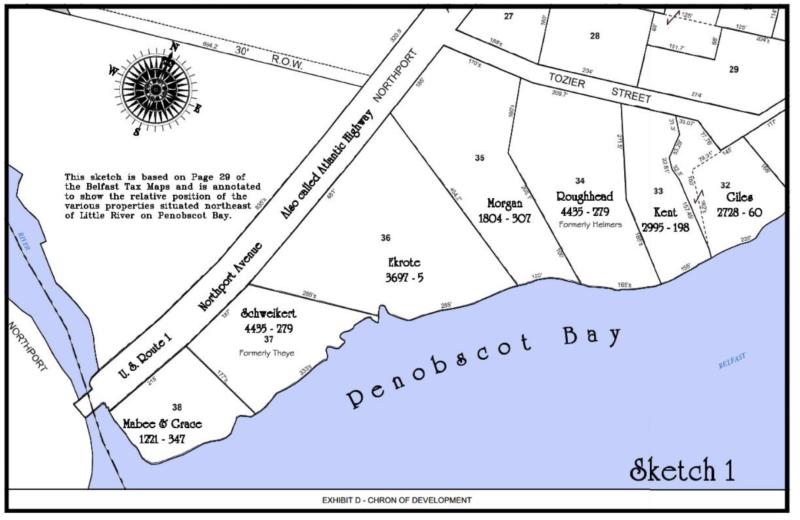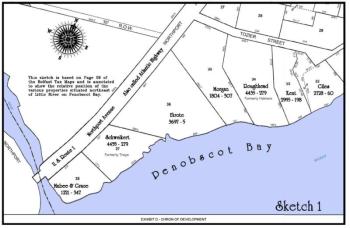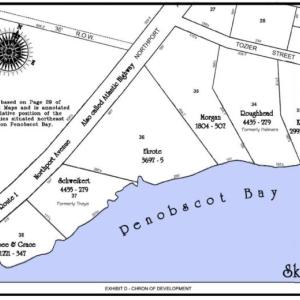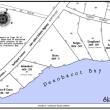Maine Supreme Judicial Court remands dispute concerning intertidal zone, Nordic Aquafarms interests, back to Waldo County Court
PORTLAND — In a decision dated Feb. 16, the Maine’s highest court vacated a Waldo County Superior Court judgement concerning intertidal land on the Belfast waterfront that borders Penobscot Bay.
The case entitled Jeffrey R. Mabee, Upstream Watch and the Friends of the Harriet Hartley Conservation Area v. Nordic Aquafarms, Inc., the Eckrotes and the City of Belfast, had been argued September 8 before the Maine Supreme Judicial Court after Justice Robert Murray, at Waldo County Superior Court, had ruled that the ownership and land use rights of intertidal land did not belong to Jeffrey R. Mabee and Judith Grace.
“We vacate the judgment, concluding, inter alia, that under the plain language of the governing deeds, the disputed land belongs to Jeffrey R. Mabee and Judith B. Grace,” wrote a panel of Maine Supreme Judicial Court Justices.
“Mabee and Grace additionally hold an enforceable servitude over the Eckrotes’ upland,” the Justices wrote. “Finally, although Friends holds an enforceable conservation easement over the intertidal land, injunctive relief to enforce the easement is not mandated under the circumstances presented.”
The issue arose after Nordic Aquafarms, Inc., the Norwegian company that has been proceeding through a state and local permitting process to build a large-scale indoor salmon raising and production plant, presented plans for running inflow and outflow pipes between Penobscot Bay and the plant site, which is on the west side of Route 1 in Belfast.
The pipes were to run between land owned by Janet and Richard Eckrotes’ upland property and the water.
The Eckrotes said that they owned the intertidal land, and in 2021, the City of Belfast bought the Eckrotes’ land to better ensure passage of pipes for the salmon plant project.
The plaintiffs, however, lead by Mabee and Grace, own property near the Eckrotes. They said that they owned the intertidal land over which the pipes were to pass, and issued a restrictive covenant and created a conservation easement on the intertidal land to prohibit construction and placement of those pipes.
The Waldo County Superior Court decision, following three days of hearings in October 2021, said Mabee and Grace did not have title to the intertidal land abutting the Eckrotes and other upland properties.
The appellants disagreed and took the case to the Maine Supreme Judicial Court.
They relied on land conveyances first made in 1946 by Harriet L. Hartley, who then owned most of the land in question.
Through research of deeds written since 1946, and involving many different families and landowners, the dispute over who owned the intertidal zone landed in court in 2019.
In considering the Waldo County Superior Court decision, the Maine Supreme Court Justices pored over deeds and historic land use law. They determined that one of the early deeds had severed intertidal land from upland properties, and ownership eventually did fall to Mabee and Grace.
In their review, the panel revisited Massachusetts Colonial Ordinance of 1641–1647, and whether grants of property include a “call to the water” or language is limited to grants of ‘to’ or ‘by’ the shore, beach and bank.
While Nordic Aquafarms had argued that the conveyance of land fell otherwise, the panel concluded that a former deed, “unambiguously conveyed the disputed land to Mabee and Grace’s predecessors in interest.”
Likewise, the panel of judges also said the restrictive covenants limiting the land use to residential purposes only was binding.
Reach Editorial Director Lynda Clancy at lyndaclancy@penbaypilot.com; 207-706-6657
























